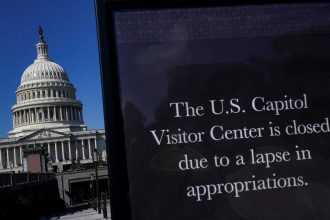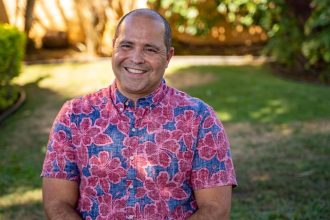NEW YORK — Mayor-elect Zohran Mamdani is assembling a team of savvy government veterans to execute his ambitious plan to institute free child care in New York City — a push Gov. Kathy Hochul supports despite funding and logistical hurdles.
Mamdani made implementing universal child care a cornerstone of his affordability-centered campaign. The promise to deliver it to families with children between six weeks and five years old stands to be his best shot at making good on one of his policy prescriptions in the near term. Hochul has said she’s committed to working with him ahead of what promises to be a tough reelection run next year.
But Mamdani is facing significant financial hurdles. As currently conceived, his citywide plan will cost $6 billion and how he’ll pay for it remains an open question. He’ll need funding from the state, which is currently grappling with President Donald Trump’s federal funding cuts and multibillion-dollar budget deficits projected for the foreseeable future.
Mamdani’s first staff and transition picks signal he’s cognizant of how hard the work ahead will be. His pick for first deputy mayor, Dean Fuleihan, a government veteran with decades of Albany and City Hall experience, had a hand in securing funding for former Mayor Bill de Blasio’s signature universal prekindergarten initiative as his budget director.
Fuleihan told POLITICO the team has started conversations with the governor’s staff on how “to make it a reality” and will continue plotting a course forward during the transition.
“It’s an imperative. We have to figure out how we’re gonna do it, but I’m very confident,” he said. “We’re going to have a positive relationship with the governor and the governor’s staff and definitely both leaders of the legislature, both conferences, and we’re going to be able to put something together.”
Fuleihan acknowledged there’s “a lot of hard implementation questions,” but pointed to how the de Blasio administration defied the odds by implementing universal pre-K sooner than anticipated.
“The same kind of citywide approach needs to happen here — that we break through bureaucracy, we break through the things that people believe are impediments and we say, ‘OK, how do we go about this,’” he said. “We won’t be putting out plans that say here’s the schedule, but we want to have that conversation with the governor and her staff first.”
City budget expert Melanie Hartzog and nonprofit president Grace Bonilla — two of Mamdani’s transition co-chairs — have also worked on early childhood and education programs. Hartzog played a critical role in expanding universal pre-K as de Blasio’s budget director.
She said the administration has to plan for a large rollout right away and cited work with different city agencies, including the Department of Education as well as the health and fire departments.
Drawing from her experience with universal pre-K, Hartzog stressed the importance of conducting comprehensive outreach, including at playgrounds, doctors offices and local clinics.
“They are fully aware of that and are just going full throttle on what it will take to implement such a citywide effort and initiative,” Hartzog said.
Mamdani, a democratic socialist, is embarking on the endeavor amid rising child care costs.
The average expense for families in New York City is around $26,000 for infants and toddlers, according to the Citizens’ Committee for Children of New York. And in 41 states, the average annual price of center-based infant care has exceeded in-state university tuition.
Families with young children were twice as likely to leave the city than those without young children, according to a report by the nonpartisan think tank Fiscal Policy Institute released last year.
The affordability crisis turned into a political vulnerability for Mayor Eric Adams, who cut funding from the city’s popular preschool program. He allocated $167 million in permanent early childhood funding and $10 million for a universal child care pilot program after pushback from city lawmakers and parents.
State support is key
To implement universal child care, Mamdani needs backing from the governor and the state Legislature.
Hochul has shown more enthusiasm for getting child care done, but they are not wholly aligned on how to pay for it.
Mamdani has proposed increasing taxes on wealthy New Yorkers and corporations. Hochul is opposed to raising income taxes, and the mayor-elect has since expressed openness to exploring other ways to finance it.
It would cost about $15 billion to implement universal child care statewide — at a time when the state is grappling with cuts from the Trump administration that could lead to a $3 billion deficit for Medicaid. The White House is also threatening to slash funding for the city when Mamdani takes office.
The governor cautioned that phasing universal child care in will take time and has pointed to other challenges: having an adequate number of facilities and training enough workers.
Mamdani discussed his plans Thursday morning during a visit to a child care center in Brooklyn. When asked by POLITICO about his latest conversations with Hochul, he acknowledged the funding issue but also pointed to policy and logistical challenges.
“In the conversations that I’ve had with the governor, it has been about fulfilling the vision of universal child care and ensuring that government becomes a partner as opposed to a burden or an obstacle,” he said. “That’s something that we are going to be spelling out in the weeks and the months to come.”
Hochul is expected to make announcements about her plans for expanding child care access during her “State of the State” address in January.
“I’ve talked to the mayor-elect before the election about getting on the path to get there,” the governor said last week during the Somos conference in Puerto Rico. “He has a four-year term. I hope to have another five years at least … To do it statewide, right now it’s about $15 billion, the entire amount of my reserves.”
Hochul and Mamdani also met at her Manhattan office Thursday afternoon, according to the governor’s office, which said they discussed a “shared desire” to make significant additional investments toward universal child care.
Lawmakers, advocates look to shape approach
Mamdani is reportedly speaking with former leaders of de Blasio’s universal pre-K program, including Emmy Liss and Laura Ensler, who heads an early childhood program in Brooklyn.
Jabari Brisport, a fellow democratic socialist and Brooklyn state senator who sponsored a free child care bill in 2021, told POLITICO he has been advising Mamdani as well. City Council Member Jennifer Gutiérrez, who previously introduced legislation similar to what Mamdani is proposing, has spoken with him multiple times about his plans, her spokesperson confirmed.
Other lawmakers and advocates have not been formally advising Mamdani’s team, but are still looking to shape the mayor-elect’s agenda.
City Council Speaker Adrienne Adams said Wednesday that she has yet to speak to Mamdani about the issue. But she urged him to extend a $10 million pilot beginning in January that offers free child care to parents in high-need areas with children up to age two. Eric Adams agreed to it as part of the final budget deal earlier this year after the Council proposed a version of it.
The Council also unveiled a framework Thursday afternoon for the next administration for addressing problems with the early childhood education system.
Meanwhile, three advocacy groups behind a campaign for free child care for 2-year-olds touted the transition members’ early childhood and child care expertise. New Yorkers United for Child Care, a parent-led group, and United Neighborhood Houses released a blueprint for the next mayor.
“He’s talking about universal child care every day that he’s in the press, so I have full confidence that he will work with us to develop that plan,” said Rebecca Bailin, executive director of New Yorkers United for Child Care, which is meeting with Mamdani in the coming weeks.
Tara Gardner, executive director of the Day Care Council of New York, stressed that boosting child care workers’ wages is key to attracting and retaining staffers.
“It’s going to be critically important to ensure that those who are currently delivering services are not further harmed by a wide-scale expansion that is probably going to happen quickly,” Gardner said.
As the incoming administration gets started on universal child care, advocacy groups warn that outstanding issues with the city’s early childhood system cannot be ignored.
Problems like delayed payments to providers and insufficient staffing for city agencies have made the system unstable.
Hundreds of students with disabilities also remain without a seat, and there continues to be a mismatch between child care supply and demand across neighborhoods.
“They are going to be inheriting a system that needs a lot of care and attention,” said Nora Moran, director of policy and advocacy at United Neighborhood Houses.
Caroline McCarthy and Jeff Coltin contributed to this report.









